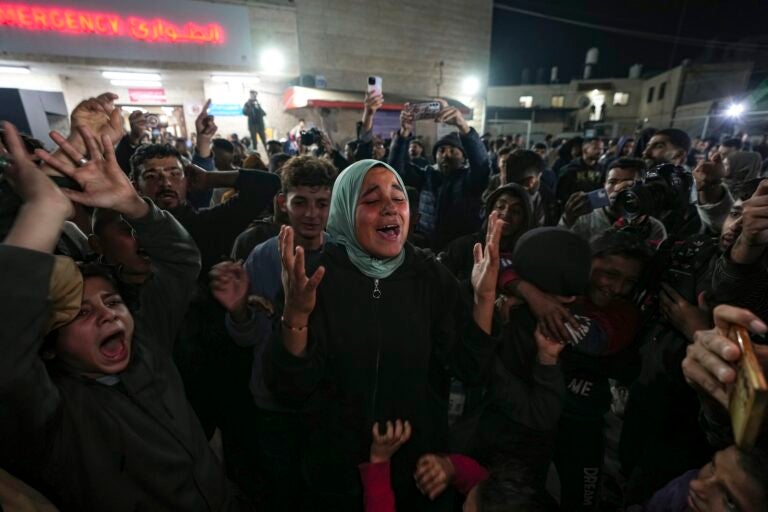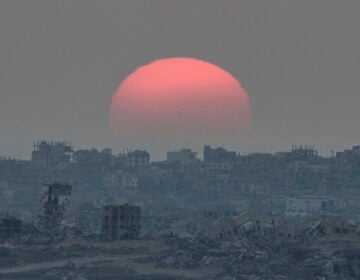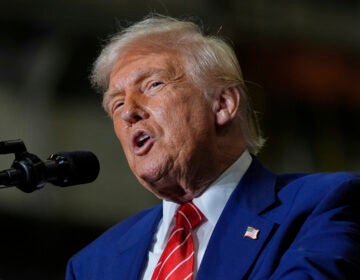Mediators tout Gaza ceasefire deal and a plan to free hostages. Israel says details are in flux
The deal, coming after weeks of painstaking negotiations in the Qatari capital, promises the release of dozens of hostages held by Hamas in phases.

Palestinians celebrate the announcement of a ceasefire deal between Hamas and Israel in Deir al-Balah, central Gaza Strip, Wednesday, Jan. 15, 2025. (AP Photo/Abdel Kareem Hana)
The Hostage Families Forum, which has long pressed Israeli leaders to make a deal that would bring the captives home, said it welcomed Wednesday’s announcement with joy and relief.
“After 460 days of our family members being held in Hamas tunnels, we are closer than ever to reuniting with our loved ones,” the group said in a statement.
Biden, who has provided crucial military aid to Israel but expressed exasperation over civilian deaths in Gaza, announced the outline of the three-phase ceasefire agreement on May 31. The agreement eventually agreed to followed that framework.
He said the first phase would last for six weeks and include a “full and complete ceasefire,” a withdrawal of Israeli forces from densely populated areas of Gaza and the release of a number of hostages, including women, older adults and wounded people, in exchange for the release of hundreds of Palestinian prisoners. Humanitarian assistance would surge, with hundreds of trucks entering Gaza each day.
The second and most difficult phase would include the release of all remaining living hostages, including male soldiers, and Israeli forces would withdraw from Gaza. The third phase calls for the start of a major reconstruction of Gaza, which faces decades of rebuilding from devastation caused by the war.
Hamas had been demanding assurances for a permanent end to the war and complete withdrawal of all Israeli forces from Gaza. Israel, meanwhile, has repeatedly said it would not halt the war until it destroys Hamas’ military and governing capabilities.
With Biden’s days in office numbered and President-elect Donald Trump set to take over, both sides had been under heavy pressure to agree to a deal.
Trump celebrated the agreement in a posting on his Truth Social social media platform: “WE HAVE A DEAL FOR THE HOSTAGES IN THE MIDDLE EAST. THEY WILL BE RELEASED SHORTLY. THANK YOU!”
Jonathan Panikoff, director of the Scowcroft Middle East Security Initiative at the Atlantic Council, said Biden deserves praise for continuing to push the talks. But Trump’s threats to Hamas and his efforts to “cajole” Netanyahu deserve credit as well.
“The ironic reality is that at a time of heightened partisanship even over foreign policy, the deal represents how much more powerful and influential U.S. foreign policy can be when it’s bipartisan,” Panikoff said.
Hezbollah’s acceptance of a ceasefire in Lebanon after it had suffered heavy blows, and the overthrow of President Bashar Assad in Syria, were both major setbacks for Iran and its allies across the region, including Hamas, which was left increasingly isolated.
Israel has come under heavy international criticism, including from its closest ally, the United States, over the civilian toll. Israel says it has killed around 17,000 militants — though it has not provided evidence to support the claim. It also blames Hamas for the civilian casualties, accusing the group of using schools, hospitals and residential areas for military purposes.
The International Court of Justice is investigating allegations brought by South Africa that Israel has committed genocide. The International Criminal Court, a separate body also based in The Hague, has issued arrest warrants for Prime Minister Benjamin Netanyahu, his former defense minister and a Hamas commander for war crimes and crimes against humanity linked to the war.
Israel and the United States have condemned the actions taken by both courts.
Netanyahu also faced great domestic pressure to bring home the hostages, whose plight has captured the nation’s attention. Their families have become a powerful lobbying group with wide public support backed by months of mass protests urging the government to reach a deal with Hamas.
Israeli authorities have already concluded that more than a third of the roughly 100 remaining people held captive are dead, and there are fears that others are no longer alive. A series of videos released by Hamas showing surviving hostages in distress, combined with news that a growing number of abducted Israelis have died, put added pressure on the Israeli leader.
Hamas, a militant group that does not accept Israel’s existence, has come under overwhelming pressure from Israeli military operations, including the invasion of Gaza’s largest cities and towns and the takeover of the border between Gaza and Egypt. Its top leaders, including Yahya Sinwar, who was believed to have helped mastermind the Oct. 7, 2023, attack, have been killed.
But its fighters have regrouped in some of the hardest-hit areas after the withdrawal of Israeli forces, raising the prospect of a prolonged insurgency if the war continues.
Netanyahu has vowed to continue the war until Hamas’s military and governing capabilities are destroyed. But it has never been clear what that would entail or if it’s even possible, given the group’s deep roots in Palestinian society, its presence in Lebanon and the occupied West Bank, and its exiled leadership.
Both sides still face many difficult and unanswered questions.
As the war winds down, Netanyahu will face growing calls for postwar investigations that could find him at least partially responsible for the security failures of Oct. 7 — the worst in Israel’s history. His far-right governing partners, who opposed a ceasefire deal, could also bring down the coalition and push the country into early elections.
There is still no plan for who will govern Gaza after the war. Israel has said it will work with local Palestinians not affiliated with Hamas or the Western-backed Palestinian Authority. But it is unclear if such partners exist, and Hamas has threatened anyone who cooperates with Israeli forces.
The United States has tried to advance sweeping postwar plans for a reformed Palestinian Authority to govern Gaza with Arab and international assistance. As part of those plans, the U.S. hope Saudi Arabia would normalize relations with Israel in return for U.S. security guarantees and aid in setting up a civilian nuclear program.
But those plans depend on credible progress toward the creation of a Palestinian state, something Netanyahu and much of Israel’s political class oppose. Netanyahu has said Israel will maintain open-ended security control over Gaza as well as the occupied West Bank, territories captured by Israel in the 1967 war that the Palestinians want for their future state.
In the absence of a postwar arrangement with Palestinian support, Hamas is likely to remain a significant force in Gaza and could reconstitute its military capabilities if Israeli forces fully withdraw.
___
Federman reported from Jerusalem. Magdy reported from Cairo. Aamer Madhani, Zeke Miller and Matthew Lee in Washington contributed to this report.
WHYY is your source for fact-based, in-depth journalism and information. As a nonprofit organization, we rely on financial support from readers like you. Please give today.





